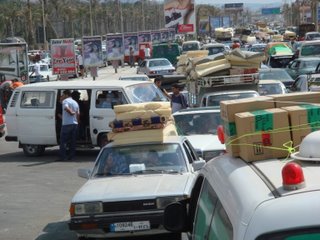On the Road with the Returning Lebanese

On the Road with the Returning Lebanese
Beirut
15 August, 2006
7:00 a.m.
This beautiful, quiet morning in Tyre fails to appropriately mourn the Lebanese lives that have been lost. The residual coolness of the night is too refreshing for the occasion, and the pilotless drones circling overhead sound more like large mosquitoes than spotters for the weapons of the fourth most powerful military force on earth.
The drones had plenty to observe yesterday. If the drive from Beirut is any indication, as many as 100,000 Lebanese may have tried to return to their homes in the south yesterday. It took us nine hours to travel what had been less than an hour away only five weeks earlier. As hawkers sold bottles of cold water to a captive market of passengers trapped in the traffic, residents of the coastal towns taunted us, "You will not return…" We laughed, which made the wait more bearable.
I soon tired of taking pictures of bombed-out bridges, overpasses and pedestrian walkovers. I had enough to show that Israel had been determined to cripple Lebanese life and livelihood.
The worst bottleneck was at the Litani, Lebanon's only major river – three hours of waiting on multiple meandering paths through banana and orange groves converging on a single lane dirt embankment built over culverts barely big enough to allow the river's flow during the dry season. It is the only way to cross without a long detour that itself faces the same problem farther upstream.
I decided not to wait in the car, and instead went down to the river to watch and take pictures. I got as far as a small undestroyed bridge over a tiny tributary of the river, and decided that it was as good a spot as any.
I was not mistaken. Young soldiers unfamiliar with their authority struggled to control frustrated drivers blocking traffic to gain a few precious feet of advantage. At one point an imam in black robes and turban emerged from his Mercedes to try to mediate a dispute, but even his authority made little difference. Most surreal was a young woman in a halter top walking her dog on a leash. Overlooking the chaos was a billboard for the Abou Dib Hotel, with an idyllic scene of resort luxury.
It was dark by the time we arrived in Tyre, where Ismail, a young Lebanese architect who was kind enough to take us in his car, suggested that we drop by the home of S, a dear friend of his. After some warm hospitality and conversation, partly to assess current conditions, we headed out again to the village of Siddiqine, which is the home of Maryam, a third member of our team. We had previously agreed to spend the night at her family home in the village.
The short drive into the low mountains took place in pitch blackness except for the headlights of the cars and the occasional generator-powered home. For all practical purposes, there was no electricity anywhere, which meant that the glow against the sky to the south could only have come from the bright lights of Israel, invisible in normal times.
The drive took us through Qana, site of the 1996 Israeli massacre of more than 100 civilians who had taken refuge in the UN compound, as well as the one less than two weeks ago that reportedly killed another 54. Soon we began to see destruction all around us within the short range of our headlights, and then the unmistakable stench of death permeated the air. At least two dead cows lay on the road, a small dehydrating calf next to one of them – a heartbreaking scene about which we could do nothing.
Unfortunately, Maryam's house was only 200 meters away, down a road made impassable with rubble. If we decided to stay, we would have to walk it with a single flashlight (mine) among us. Maryam's brother had negotiated the passage earlier in the day and determined that the house was relatively untouched. However, doing it at night was another matter, especially with the stench of the cows in our nostrils and earlier warnings of cluster bombs. We headed back to the house of S in Tyre, and accepted her hospitality for the night.
This morning we will head out to Siddiqine and some other villages to do a bit of factfinding so that we can report back to our group in Beirut what sort of civil resistance/solidarity project might be feasible to undertake. Who knows? Perhaps this will be the first day since my arrival without a single meeting to attend.
Paul Larudee

0 Comments:
Post a Comment
<< Home